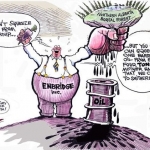Explore Publications
Authorities of Shell Petroleum Development Company (SPDC) have unveiled a new security strategy for securing oil pipelines and platforms within the Niger Delta region. Shell has appointed former MEND militant commander, Eris Paul, and his company, Eristex Pipeline Patrol, to secure oil facilities in the Southern Ijaw area of the Delta.
Read MoreUS and Ghanaian authorities are investigating corruption allegations involving a Texas oil company and the local partner that helped it secure control of the Ghanaian oil block that yielded one of Africa's biggest recent discoveries. The case risks complicating efforts by Texas company Kosmos to sell its stake in the Jubilee oil field to ExxonMobil in a deal valued at $4bn.
Read MoreThe last time the European Union decided the future of its 50 billion euro agricultural aid program, in 2005, the deal was cut behind closed doors in a luxury suite at the five-star Conrad Brussels hotel. Now, 2013 is closer at hand and a new round of maneuvering has begun to reshape the richest system of agricultural handouts in the world.
Read MoreSome of the greenest technologies of the age, from electric cars to efficient light bulbs to very large wind turbines, are made possible by an unusual group of elements called rare earths. Most of these come from China. "In many places, the mining is abused," said Wang Caifeng, the top rare-earths industry regulator at the Ministry of Industry and Information Technology in China.
Read MoreLocal translators are hidden casualties of the wars in Iraq and Afghanistan. The U.S. military uses defense contractors to hire local residents to serve as translators for the troops. These local translators often live, sleep and eat with soldiers. And yet when they are wounded, they are often ignored by the U.S. system designed to provide them medical care and disability benefits, according to an investigation by the Los Angeles Times and ProPublica.
Read MoreFor Emad Hatabah, the war in Iraq became a business opportunity. As AIG's chief representative in Jordan, he was responsible for coordinating the care for hundreds of Iraqis who had been injured while working under contract for U.S. troops. He fulfilled his functions by sending business to himself, his friends and business associates, according to interviews and records.
Read MorePatrick Daniel, the CEO of Enbridge Inc, is bullish about the future of unconventional oil from Canada's massive tar sand deposits. His company not only operates North America's longest crude oil and liquid pipelines, but transports 12 percent of the oil that the U.S. imports daily. Canada's bitumen, or dirty crude, lies under a forest area the size of England and is arguably the world's last remaining giant oil field.
Read MorePatrick Daniel, the CEO of Enbridge Inc, is bullish about the future of unconventional oil from Canada's massive tar sand deposits. His company not only operates North America's longest crude oil and liquid pipelines, but transports 12 percent of the oil that the U.S. imports daily. Canada's bitumen, or dirty crude, lies under a forest area the size of England and is arguably the world's last remaining giant oil field.
Read MoreOn the night of December 2-3, 1984, the Union Carbide pesticide factory in Bhopal, India leaked poisonous methyl iso cyanate into its densely populated neighborhood, killing 8,000 people in the immediate aftermath. 25 years later, Dow Chemical (which purchased Union Carbide in 2001) still refuses to clean up the site. But a new generation of Bhopal survivors is taking on the fight.
Read MoreFor plants designed in a lab a little more than a decade ago, they've come a long way: Today, the vast majority of the nation's two primary crops grow from seeds genetically altered according to Monsanto company patents. Now Monsanto -- like IBM and Google -- has drawn scrutiny from U.S. antitrust investigators.
Read More